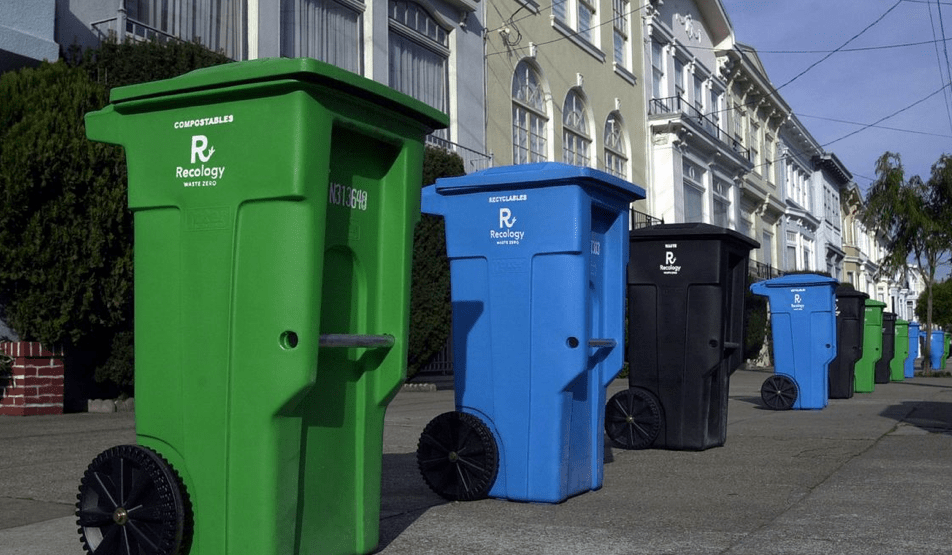Curbside composting on the radar but a ways off in city neighbourhoods: councillor
Even though the regional district is moving toward district-wide composting and organic waste diversion beginning in 2018, with some community curbside compost pickup, the City of Nelson won’t be on that same track for some time, says one city councillor.
Michael Dailly said the city would not consider curbside compost pickup for a few years, at least until the city’s current garbage and recycling truck is designated for replacement.
He said curbside compost pickup would be an expensive option at the moment for the city because it would require the scheduling of an additional pick up. The current truck being used is not designed for compost pick up.
“(I)t is scheduled for replacement in the next two to three years and we could consider purchasing a truck with additional capacity that could accommodate compost,” he said. “We would also need to create a composting site and the purchase of suitable containers for each household.”
The Regional District of Central Kootenay (RDCK) board of directors is currently considering composting and organics diversion as part of the Solid Waste Management Plan — the result of a provincial directive. Under the Environmental Management Act, a regional district can use its bylaw to regulate the management of municipal solid waste.
Since the City of Nelson is linked to the RDCK through the Joint Resource Recovery Committee, if the regional district proceeds with implementing organics diversion as part of their updated Solid Waste Management Plan, then the city will be compelled to implement an organics diversion process to remain compliant with the materials that can be accepted by the regional district landfill.
The regional district is currently updating the Solid Waste Management Plan — to be fleshed out over the next 18 months — determining the direction of waste and recycling services for a 10-year period.
Toward this end, the regional district is also considering the establishment of a facility that would process the diverted organics, said city Public Works manager Colin Innes.
The goal of the city and the RDCK is to reduce waste going to landfill, said Dailly, with up to 30 per cent of all waste — which is organic material — that could be composted.
“If diverted there would be a significant cost savings on tipping fees which, in theory, could be applied to the creation of a composting program,” he said.
Dailly was in favour of an organic waste diversion program in the city, with several options including backyard or local neighbourhood composting sites, as well as curbside pick up.
“These options and associated costs will be examined during our budget deliberations which begin in November,” Dailly explained.
The RDCK is in the process of updating its 2010 resource recovery plan to meet both mandated provincial guidelines, with the need to divert organic waste from the waste stream. Based on a public survey done in June and July this year, a draft resource recovery plan for 2018 has been produced.
The survey — based on the responses of one per cent of the regional district population — found that most residents across the RDCK already engage in some form of resource recovery, with 47 per cent saying they haul their yard waste to a landfill or municipal collection facility.
It was found that 62 per cent of people say they backyard compost, while the survey found 53 per cent felt it was important to introduce programs for diverting food waste from the landfill, even if it increased user costs.
The regional district has said it would support municipalities in setting up curbside collection — although the organic waste diversion program would be voluntary for communities at first — moving toward private haulers in addition to current garbage and recycling collection services.
The draft report suggested the region’s largest municipalities — like Nelson — are top priority since it is where the largest amounts of organic materials can be diverted from the landfills at a lower cost. Smaller centres and rural areas were second and third priority.
Under the proposed strategy, the regional district would create a composting facility for residential and commercial food scraps at the Creston landfill and the closed central landfill near Salmo, with material from Nelson, Castlegar and Creston diverted there.
“My goal is to raise awareness of full-cost accounting in our all of our decision making,” said Dailly. “Our focus has been on direct costs. Responsible decisionmaking must include consideration of indirect costs by collecting and understanding information about the possible environmental and social costs along with economic ones.”
He said the city needed to keep an open mind about new ideas, technologies and practices that will help it reach its stated goals of reducing waste and lowering greenhouse gas emissions.
The proposed plan would be phased in over a five-year period, from 2019-2024 under three phases: incentives in phase one would include rebates on backyard composters, with workshops on waste management and a public awareness campaign with WildSafe BC.
Phase two would see a ban on the disposal of orgnaic waste from the industrial, commercial and institutional sector along with a commercial collection service. Phase three would see rural programs started.
The process is expected to be completed in time for a regional district vote on the plan in November.


























